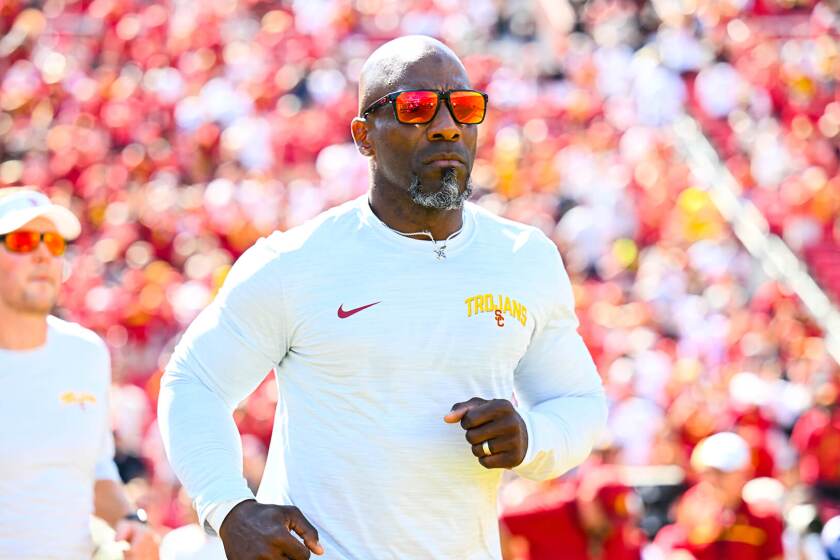Time Is on His Side : Borelli Keeps USC Tennis Team on a Winning Schedule
- Share via
Dave Borelli, coach of the USC women’s tennis team, monitors time more closely than a student at a boring lecture. His players call him “Mr. Timex,” and at practice, he replies to even the most simple question with Swiss precision.
“Coach, how long before the next water break?”
“Eight minutes and 30 seconds.”
Although his players enjoy practice, the time between breaks seems longer at USC because Borelli believes tennis should not be all play. He has developed a regimented program that is considered one of the nation’s best.
Borelli believes drills are more beneficial than sets. Repeated practice games, he said, slow a player’s progress.
“You may only work on a shot five or six occasions in the course of a one-hour set,” said Borelli, a Van Nuys High graduate who lives in Sherman Oaks. “If you go out there and work on a shot for 10 minutes, you hit it a lot more times in less time.”
The constant clock-watching may be time-consuming, but it is immensely productive. Borelli’s results are matchless.
Last season, Borelli guided the Trojans to their seventh national championship in nine years. His players have been selected to All-American teams 46 times, and 14 have been ranked among the top 120 players in the world.
Borelli, who has a winning percentage of .911 in 12 years at USC, uses a system that emphasizes a serve-and-volley approach along with ground strokes. He said the recent dominance of Martina Navratilova has shown players the value of a complete game.
Some women’s tennis matches could be measured with a sundial because the players seldom leave the base line. Borelli believes that these players, whom he calls “Chris Evert Lloyd clones,” will no longer become top players.
“That type of game really requires someone who’s mentally tougher,” Borelli said. “Chris Evert is mentally stronger than Martina, but Martina will win more often because she can do more with the ball. When you have a complete game, you don’t have to play as well to win.”
Despite Evert Lloyd’s success, her style has been detrimental to the game’s progress, Borelli said. Players entering college 10 years ago had more complete games, and many of today’s college players have trouble with volleys and are poor in doubles, he said.
Although Borelli stresses the serve-and-volley style, women won’t be successful solely with that approach, he said.
“You’ll never see a pure volleyer in women’s tennis because it’s too difficult for them,” he said. “The fact that they don’t jump as well as men prevents them from closing into the net like some men.”
Borelli has also become a top coach by breaking down the barriers between coach and player. Former players routinely stop by for a practice, and Mr. Timex always has a minute for them.
“A lot of coaches hand their players the balls in practice and that’s it,” Borelli said. “My commitment to help my players doesn’t end after four years.”
In September, Borelli resumed coaching Beth Herr, who turned professional after winning the NCAA singles championship as a freshman in 1983. Herr was ranked No. 31 in the world in 1983 but dropped to No. 85 in September.
Since working with Borelli, she has improved to No. 48 and won her first Virginia Slims tournament two weeks ago in Tucson, Ariz.
“He’s the greatest motivator of any coach I know,” Herr said. “When you’re in a match and you have him on your side, you have all the confidence in the world.”
Two of USC’s top singles players, Heliane Steden and Claudia Hernandez, moved from Mexico to gain that confidence. The other four women in the lineup are from Kentucky, Oklahoma, Illinois and Indiana.
“Borelli scares the hell out of me with recruiting because he’s so charming,” Stanford Coach Frank Brennan said. “I can have a girl in the bag and then she makes a visit to USC and starts to waver on her decision.
“Some of the Southern California-area players won’t even talk to me. They’re going to USC and that’s it.”
To maintain team unity and good feelings among his players, Borelli arbitrarily decides his singles lineup. Some coaches have their players play against each other in challenge matches.
“Challenge matches have a disruptive influence,” Borelli said. “I’d rather make the decision where the kids play and have them upset at me instead of upset at each other.”
Team unity may be important, but national championships are won on the court. And that is where Borelli is at his best. A college coach may talk to his player at any time in the match--as long as it does not disrupt play. In a close match, it is not uncommon to see Borelli talking with a player at every net change.
Three weeks before the NCAA Division I championships in Austin, Tex., the Trojans are 17-2 and ranked No. 1 by the Intercollegiate Tennis Coaches Assn.
According to Borelli’s timetable, that puts the Trojans right on schedule for a run at another national title.
More to Read
Go beyond the scoreboard
Get the latest on L.A.'s teams in the daily Sports Report newsletter.
You may occasionally receive promotional content from the Los Angeles Times.





